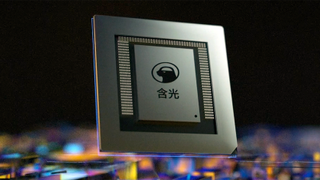Alibaba's 128-Core Armv9 Server Processor Available for Preview
Alibaba's 128-core server processor is ready for trials.

Alibaba Cloud has started offering its clients a new type of instance powered by its own 128-core Yitian 710 server-grade system-on-chip (SoC) introduced last October. Apparently, the processor designed by Alibaba's T-Head subsidiary is now ready to power Alibaba's instances. But to try it, companies have to get an invitation from Alibaba, and the number of Yitian-powered instances is extremely limited.
Alibaba's T-Head Yitian 710 server SoC packs 128 Armv9 cores operating at 3.20 GHz. It has eight DDR5-4800 memory channels that can provide the cores up to 307.2 GBps of bandwidth, as well as 96 PCIe 5.0 lanes to attach high-performance solid-state storage, network cards, and other devices. The Yitian integrates 60 billion transistors and is made using a 5 nm fabrication process, making it one of the most complex processors ever developed.
Specifically for its Yitian 710, Alibaba Cloud developed its proprietary Panjiu servers. Panjiu separates computing from storage and is designed both for general-purpose and accelerated AI workloads. In addition, such machines can be used for high-performance storage applications.
As both the Yitian 710 and Panjiu were designed specifically for Alibaba's cloud services, the company is now beginning to offer its clients to test them with its Elastic Compute Service (ECS) instance type, called g8m, reports The Register. In particular, users can preview their work with ecs.g8m.xlarge virtual machine, a server with four vCPUs (cores) operating at 2.75 GHz, 16 GB of memory, and 3 Gbps of network bandwidth that can be accelerated to 10 Gbitps under heavy loads and when capacity permits.
For some reason, Alibaba only offers 100 instances to select clients and will serve the orders on a first-come, first-served basis. With only 100 quad-core instances on offer, we imagine that Alibaba has a very limited number of servers running its Yitian 710 server SoC. Furthermore, it's likely the processors used for these servers do not have all of their 128 cores enabled.
Alibaba did not reveal anything about the performance offered by its instance or when the trial will end. It also did not disclose when the Yitian 710 processors and Panjiu servers will be available for a broader audience.
But while the availability of Yitian 710-based machines is extremely low and so far not everyone can even try it, it is evident that Alibaba Cloud is serious about developing its own server-grade SoCs for its cloud services. The main question is how competitive are these processors and whether they can actually replace CPUs from AMD and Intel, which are used by the cloud giant today.
Stay on the Cutting Edge
Join the experts who read Tom's Hardware for the inside track on enthusiast PC tech news — and have for over 25 years. We'll send breaking news and in-depth reviews of CPUs, GPUs, AI, maker hardware and more straight to your inbox.

Anton Shilov is a Freelance News Writer at Tom’s Hardware US. Over the past couple of decades, he has covered everything from CPUs and GPUs to supercomputers and from modern process technologies and latest fab tools to high-tech industry trends.
-
Unolocogringo No surprise.Reply
China has already stated they want to become chip independent.
They want 25% off all of their computers running home grown chips by 2025.
So expect more and more homegrown chips in the future.
Most Popular



